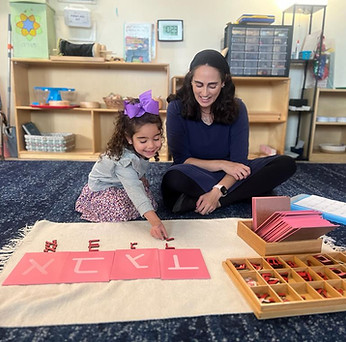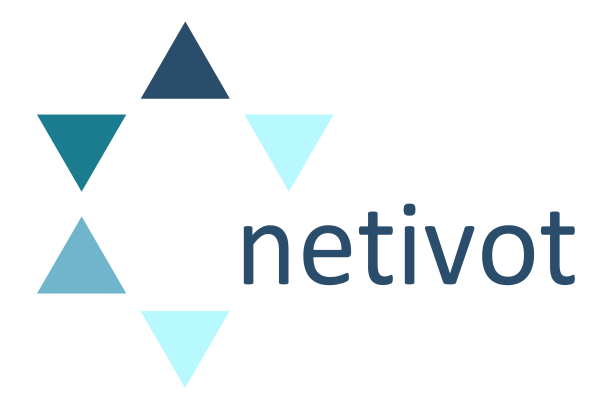OUR CLASSROOMS
INFANTS

6 weeks - 18 months
The Netivot Infant Program provides in-home style care that enriches and stimulates the young child’s natural development through freedom of movement. Our Infant teachers recognize that children at this stage are building their understanding of the world by absorbing and capturing everything from their environment. They are highly attuned to the needs of infants, and foster a respectful and nurturing environment with their physical and verbal interactions. The teachers place great emphasis on language by describing their actions to the children throughout the day. The room itself is designed to promote gross and fine motor skills such as reaching and climbing, grasping, and transferring, which are integral to cognitive development. Through careful observation, the teachers provide a specialized curriculum that guides the young child along his or her natural trajectory. Even at this youngest age, the environment is rich with Jewish identity, from materials related to the chagim to a daily tefilah circle.
PRE-PRIMARY
18 months - 3 years
“I did it!” No phrase better reflects the goal of the toddler years. The Netivot Pre-Primary program offers toddlers the opportunity to work with delicate and beautiful materials in a peaceful and respectful environment and to experience the sense of accomplishment that is so vital to their development. Netivot toddlers enjoy an environment scaled to their size, featuring custom-sized tables and chairs, bookshelves and low mirrors. Breakable cups and dishes are provided, promoting self awareness and responsibility. Each activity in the classroom has a specific purpose which appeals to their natural curiosity and intrinsic sense of order. The children thrive with clearly defined limits and consistent and kind redirection. In a Montessori classroom, the child is not served but is shown how to become self-reliant or to ask older peers for assistance. Because our teachers are avid observers who customize the curriculum to the needs of the children, the work available to them grows and changes with their development throughout

the year. To interact with children, Pre-Primary teachers are sure to lower their bodies to the child’s eye level, treating each student with warmth and respect. Through social interactions, our toddler friends discover what it means to be a member of a group, thus learning how to communicate their desires and needs in a gracious and effective way. They are given the tools to develop not only their confidence but their midot, character traits, that will serve them—and their communities—throughout their lives. Both Hebrew and English are spoken in the classroom, with a strong focus on brachot, tefilot, chagim, and Jewish identity.
PRIMARY

3 - 6 years (Pre-School through Kindergarten)
The Netivot Primary classroom is an environment alive with exploration and discovery. Children select from a variety of works designed to cultivate and sharpen their senses and cognitive abilities and to help them develop focus and concentration. A cornerstone of every Montessori classroom, the practical life area includes activities such as pouring, tying, polishing, sewing and woodworking. These skills instill order and discipline and give young children a sense of mastery over their world. Nearby, sensorial works are available to refine the senses of sight, smell, touch, and hearing, and also to lay the foundations for math. The math area attracts children with colorful glass beads and natural wood materials, teaching number concepts and basic operations and laying the groundwork for more advanced concepts such as squaring and cubing. Manipulative and tactile materials permeate the language areas as well. Children prepare for reading and
writing by using their hands, tracing sandpaper letters and building words with a moveable wooden alphabet. At Netivot, Hebrew and English reading and writing skills are developed alongside one another, and the Hebrew language area has a full complement of materials to match the Montessori English sequence. In the Netivot Primary, children are constantly exposed to the stories and lessons of Jewish heritage. They learn the parasha each week and receive new works in the practical life, language and science areas in preparation for each chag. But Jewish content is not limited to these specific subjects. Just as the Montessori curriculum exposes children from a very young age to geography, botany, zoology, chemistry and physics in an effort to open their minds to the wonders of their world, Netivot embraces these areas of study as a way of instilling children with ahavat Hashem and yirat Shamayim, love and awe of God. Similarly, grace and courtesy, a focal point of Montessori education, are here framed as derech eretz, the critical Jewish value of treating others with respect and kindness.
LOWER ELEMENTARY
6 - 9 years (1st-3rd Grade)
The Netivot Lower Elementary classroom is a learning laboratory designed to foster each child’s intellectual and social/emotional growth. Throughout the school day, children are given the freedom to interact with one another, forming important ideas of society and community while engaging in meaningful academic pursuits. In the language area, children use three-dimensional shapes, miniature environments, objects, pictures and interactive games to study parts of speech, punctuation, and sentence analysis. The Montessori grammar method is shared between Hebrew and English, so that children transfer concepts from one language to the other. Special care is taken to foster conversational Hebrew at this level. By breaking down the language into its components (nouns, verbs, adjectives, and so on), the Netivot curriculum promotes a high degree of Hebrew fluency by the end of the third elementary year. The math area is also characterized by an array of manipulative

materials. Montessori math guides children from the concrete to the abstract, allowing them to develop true mastery of concepts before moving to equations on paper. Children who learn math in this way have a deep understanding of the operations they perform. In addition to math and language, Lower Elementary is designed to provide a rich tapestry of knowledge in what Maria Montessori called the “cultural subjects.” At Netivot, these include parasha, tefilah, chumash, chagim, and tziyonut, as well as zoology, botany, geography and history. All aspects of the curriculum are carefully designed to interlace and complement one another, so that, for example, a study of Breishit might coincide with science experiments about the composition of the earth, or God’s promise that Avraham’s progeny would be numerous as the stars might coincide with a study of the cosmos. Both General and Jewish Studies teachers are present in the classroom throughout the day, so that children may work in any discipline at any time and develop a sense of cohesion among all areas of study. In this way, we connect all subjects to limudei kodesh, because every aspect of the curriculum is related to Torah and Jewish values.
UPPER ELEMENTARY

9-12 years (4th-6th Grade)
At the Upper Elementary level, students begin to understand the scope of the universe and examine their place within it. They revisit the broad, impressionistic presentations they have seen in earlier years and learn to look more deeply, focus on details, and place individual ideas within their greater context. Both General and Jewish Studies begin to become more research based in the Upper Elementary years. Students develop the skills to study Chumash and Mishna with greater independence and to ask questions about the text that guide them toward commentary and explanation. In Science and History, they learn to explore the make-up of our world and the complexities of the generations who have come before us. The overarching goal of integration is achieved easily at this level, as students are able to consider each Limudei Kodesh topic alongside world history, the sciences, art, and music. For example, while studying Mishna,
they develop a deep understanding of the Roman period and the compilation of the Torah Sheb’al Peh (Oral Torah). The Upper Elementary language and math curricula continue to employ manipulative materials to allow students to visualize concepts concretely before moving to abstraction. In English language, an emphasis is placed on sentence analysis, broadening vocabulary and effective use of words. In Hebrew, the goal is fluency in speaking and writing. Perhaps one of the most important elements of the fourth through sixth grades, however, is work that can be accomplished primarily outside of the classroom. As Upper Elementary students begin to make sense of their place in the world, we also encourage them to take responsibility for their community. They participate in chesed projects such as preparing Shabbat food packages for families in need and spearheading conservation initiatives to help our school and families go greener. In this way, they begin to develop an internal drive to uphold all three pillars of our world: Torah, Avodah (worship) and Gemilut Chasadim (acts of lovingkindness).
MIDDLE SCHOOL
12-13 years (7th-8th Grade)
The Middle School at Netivot is a transitional program designed to cultivate in our students a high level of confidence and preparedness for high school. Curriculum at this level is presented in the abstract rather than through materials, though a high degree of experiential learning is still included. The classroom experience begins to shift to a slightly more frontal approach, paving the way for students to feel comfortable in conventional high schools. Having consolidated their ability to read and translate text over the course of previous years, students are now asked to discuss the deeper themes of Chumash and Navi. They read psukim and Rashi independently and determine the pshat (simple meaning) of a pasuk as well as the possibilities presented by mefarshim (commentators). At this age, we also begin the study of Gemara, based on the preceding years of exposure to Mishna. A strong emphasis is placed on key words and set phrases in the dialectic of the Gemara so that students develop familiarity and comfort in this arena of Limudei Kodesh.

In General Studies, math lessons continue to be based on each child's pace and level of readiness, with small group lessons allowing for a high degree of differentiation. Language Arts focuses on high caliber writing, including attention to detail, rich, descriptive language, and a strong writer's voice. Our History curriculum requires students to read primary sources and debate the ethical positions of historical figures. Another cornerstone of the Montessori Middle School program, the final application of the "practical life" curriculum, is the student management of their own business. Netivot 7th and 8th graders typically run a hot lunch business, producing meals for approximately 40% of the student population. Through the business program, they learn the real world skills of designing a product, marketing it, creating budget projections and profit and loss analyses, and providing customer service. In this last leg of their Montessori journey, students are said to take part in the process of "valorization", becoming a strong a worthy person, blessed with selflessness, optimism, confidence, dignity, self-discipline, independence, helpfulness, the ability to work with others, and good judgment. It is our mission to channel of these attributes toward becoming a true ben or bat Yisrael, a strong and worthy member of the Jewish People.
